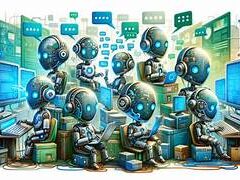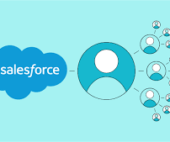Agentforce: Redefining Generative AI in Salesforce
Many Dreamforce attendees who expected to hear about Einstein Copilot were surprised when Salesforce introduced Agentforce just a week before the conference. While it might seem like a rebranding of Copilot, Agentforce marks a significant evolution by enabling more autonomous agents that go beyond summarizing or generating content to perform specific actions.
Here’s a breakdown of the transition and what it means for Salesforce users:
Key Vocabulary Updates
- Agentforce: The overarching name for generative AI-powered agents in Salesforce.
- Agent Actions/Agent Studio: Previously known as Copilot Actions/Copilot Studio, these define what agents can do, such as identifying records, summarizing data, or composing emails.
- Prompt Builder: Retains its name and functionality as a tool for creating, testing, and managing generative AI prompts for various large language models (LLMs).
How Agentforce Works
Agents take user input, known as an “utterance,” and translate it into actionable steps based on predefined configurations. This allows the system to enhance performance over time while delivering responses tailored to user needs.
Understanding Agentforce
1. Topics: Organizing Agent Capabilities
Agentforce introduces “Topics,” a new layer of organization that categorizes actions by business function. When a user provides an utterance, the agent identifies the relevant topic first, then determines the best actions to address it.
- Why Topics Matter: Topics prevent agents from selecting incorrect actions and enable support for more custom actions. While Einstein Copilot supported 15-20 actions, Agentforce can handle significantly more by leveraging this additional layer of structure.
2. Actions: What Agents Can Do
Actions remain largely unchanged from Einstein Copilot. These are tasks agents perform to execute plans.
- Standard Actions: Out-of-the-box functionality includes tasks like opportunity summarization and email composition, providing quick wins for organizations looking to get started.
- Custom Actions: For bespoke use cases, you can create tailored actions using Apex, Flows, Prompts, or Service Catalog items (currently in beta).
3. Prompts: The Key to Better Results
LLMs rely on prompts to generate outputs, and crafting effective prompts is essential for reducing irrelevant responses and optimizing agent behavior.
- Prompt Builder: A low-code tool for building, testing, and refining prompts, ensuring agents deliver accurate and contextually relevant results.
How Generative AI Enhances Salesforce
Agentforce unlocks several benefits across productivity, personalization, standardization, and efficiency:
- Productivity: Summaries and other AI-driven insights save users time by preparing key information for meetings or customer interactions.
- Personalization: AI-crafted emails and responses ensure interactions are tailored to individual client needs.
- Standardization: Templates and standardized workflows ensure all users work from the same data points, enhancing consistency across teams.
- Efficiency: Automating workflows like service case handling allows teams to focus on more complex tasks.
Implementing Agentforce: Tips for Success
Getting Started
Start by using standard Agent actions. These out-of-the-box tools, such as opportunity summarization or close plan creation, provide a strong foundation. You can make minor adjustments to optimize their performance before diving into more complex custom actions.
Testing and Iteration
Testing AI agents is different from traditional workflows. Agents must handle various phrasing of the same user request (utterances) while maintaining consistency in responses.
- Repeated Testing: Since AI uses probabilistic models, responses can vary. Repeated testing ensures reliability.
- Contextual Adaptability: Agents should adapt to different contexts, such as summarizing an opportunity from an account page versus an opportunity page.
The Future of Salesforce with Agentforce
As you gain expertise in planning, developing, testing, and deploying Agentforce actions, you’ll unlock new possibilities for transforming your Salesforce experience. With generative AI tools like Agentforce, Salesforce evolves from a traditional point-and-click interface into an intelligent, agent-driven platform with streamlined, conversational workflows.
This isn’t just an upgrade — it’s the foundation for reimagining how businesses interact with their CRM in an AI-assisted world.













